For the sins of the father
September 3, 2025
In the early 1900s, female teachers were not allowed to ride bicycles. It was considered improper, and it was not uncommon for school boards to declare that it promoted immorality among children.
It’s funny to think about these old-fashioned ideas on morality and immorality, good and bad. Who challenged them? When did people realise they were silly? How did they change?
The rain rolls over my garden in Zeehan and a piece of blue and green rubbish blows with it. “Who gives a crap?” it says, and I recognise it as the wrapping of a popular toilet paper brand. Would the school I work in ever buy this brand of toilet paper? I laugh; how could they, when the brand constitutes a forbidden obscenity? I consider the number of children I have punished for swearing in the last week, excluding them from class, calling their parents… It seems so old-fashioned when I do my shopping at Shiploads which sounds like Sh*#loads and the government releases an ad campaign with the tagline “Australia, where the bloody hell are you?” Are we behind the times in schools? Are we enforcing an outdated ethic when the rest of the community has moved on?
The thing I love most about the West Coast is the directness of people. I’ve had parents come to parent-teacher meetings to tell me, “my kid is a f*/#$ing c*&t, don’t try to tell me otherwise". You spend two minutes at the Heemskirk Pub and you would have heard one of the most beautiful rainbows of language available South of Victoria. The people here are not trying to polish anything, they just tell it like it is. I can only imagine that a visit to Renison Bell or MMG would be a linguist’s dream.
Yet, when I go to work, I have to punish nine- and ten-year-olds for using words that are a respectable part of the local vernacular. I have even heard students being told off for saying words that sound like swear words. What is it that exists in us, that we are making young people responsible for? In their article Swearing in Class, Doherty, Berwick and McGregor tell us that school is asked to undertake “moral work on behalf of society, shaping the child into the future citizen such that society can establish common moral ground”, but how common can that moral ground be if most adults in a given society think that it’s perfectly moral and good to swear?
This is not a problem unique to the West Coast of Tasmania. In fact, Doherty et al found that “suspension on the grounds of verbal misconduct is increasing in schools” throughout Australia. They remind us that language practices in schools cannot be “hermetically sealed from language practices in broader society”, i.e. the child is going to be influenced by what they hear at home. When we punish swearing at school, it is no longer an act of moral correction, it is an exercise of power. If the same values are not shared by schools and communities, the school has decided to represent itself as morally superior. When we correct students from this position, we are saying “I’m right because I’m the teacher”. This is an outdated power grab by a group of individuals who are holding on to their sense of authority by a thread. I have no respect for people who use power in this way, and neither do the students.
It may be that in the English-speaking world the meaning and use of swear words is changing. The researcher Robbie Love comments in a recent Guardian article: “If I say, ‘who the fuck did that?’, as opposed to ‘who did that?’, what does ‘fuck’ actually mean? It’s just emphasising the general sentiment.” Yehuda Baruch reflects on his research on swearing in workplaces, saying it creates team cohesion, relieves stress, and emphasises a point.
When adults in wider society not only condone, but encourage, the positive uses of swearing in these ways, it becomes patronising and hypocritical to police children for using the same language. As teachers we need to prepare students to live and work in the real world. By holding on to archaic puritan values, we only alienate the students from us, and ourselves from reality.
The modern school is in the Pretend-Pretend. A world where puritan values flourish and teachers have to act as though they are more virtuous than the rest of the population. Some may enjoy this righteousness because it comes with a sense of power and moral superiority, but in essence it is an unhealthy lie. If we are honest with ourselves and our aim really is to combat swearing, then it is out there that it needs to change, not within the walls of the school. If we reform language in the wider community, we’ll see those same reflections at school. If we don’t want to alter the language in our community, maybe we should just let kids be, allowing them to have access to all the modes of expression that we ourselves have access to.
Bibliography:
Swearing in class: Institutional morality in dispute, Linguistics in Education, 2018, Doherty, Berwick, McGregor.
Swearing is becoming more widely acceptable linguistic experts claim, The Guardian, 2024, David Batty
The views expressed in this article may or may not reflect those of Pearls and Irritations.

